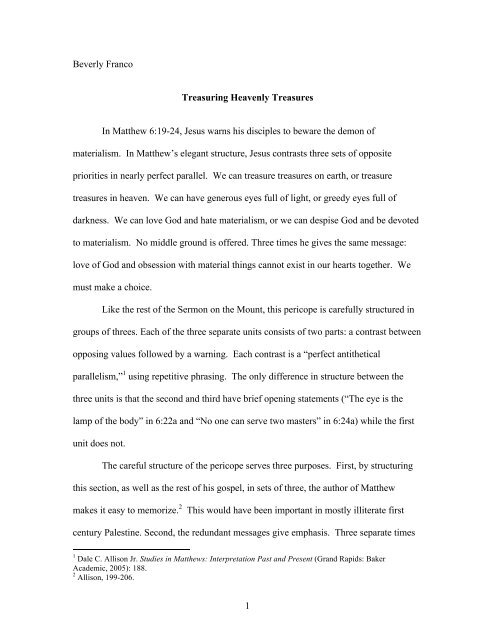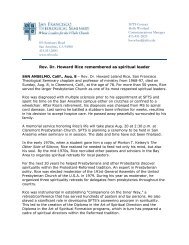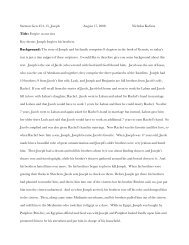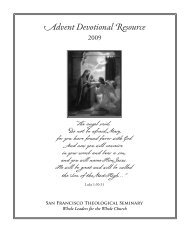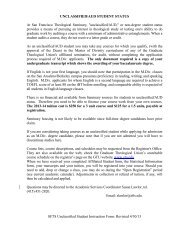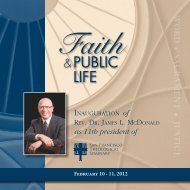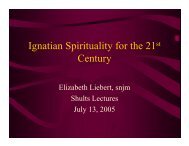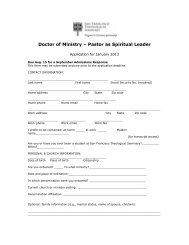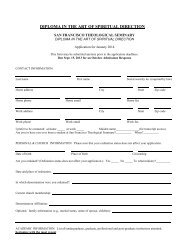Bev Franco Essay - San Francisco Theological Seminary
Bev Franco Essay - San Francisco Theological Seminary
Bev Franco Essay - San Francisco Theological Seminary
You also want an ePaper? Increase the reach of your titles
YUMPU automatically turns print PDFs into web optimized ePapers that Google loves.
<strong>Bev</strong>erly <strong>Franco</strong><br />
Treasuring Heavenly Treasures<br />
In Matthew 6:19-24, Jesus warns his disciples to beware the demon of<br />
materialism. In Matthew’s elegant structure, Jesus contrasts three sets of opposite<br />
priorities in nearly perfect parallel. We can treasure treasures on earth, or treasure<br />
treasures in heaven. We can have generous eyes full of light, or greedy eyes full of<br />
darkness. We can love God and hate materialism, or we can despise God and be devoted<br />
to materialism. No middle ground is offered. Three times he gives the same message:<br />
love of God and obsession with material things cannot exist in our hearts together. We<br />
must make a choice.<br />
Like the rest of the Sermon on the Mount, this pericope is carefully structured in<br />
groups of threes. Each of the three separate units consists of two parts: a contrast between<br />
opposing values followed by a warning. Each contrast is a “perfect antithetical<br />
parallelism,” 1 using repetitive phrasing. The only difference in structure between the<br />
three units is that the second and third have brief opening statements (“The eye is the<br />
lamp of the body” in 6:22a and “No one can serve two masters” in 6:24a) while the first<br />
unit does not.<br />
The careful structure of the pericope serves three purposes. First, by structuring<br />
this section, as well as the rest of his gospel, in sets of three, the author of Matthew<br />
makes it easy to memorize. 2<br />
This would have been important in mostly illiterate first<br />
century Palestine. Second, the redundant messages give emphasis. Three separate times<br />
1 Dale C. Allison Jr. Studies in Matthews: Interpretation Past and Present (Grand Rapids: Baker<br />
Academic, 2005): 188.<br />
2 Allison, 199-206.<br />
1
we are warned to choose God over materialism. In addition, there are redundant word<br />
choices within each set, which also creates emphasis, 3 such as the use of θησαυρίζετε<br />
µ ν θησαυρο ς, literally, “Treasure for yourselves treasures.” This repetition,<br />
according to Betz, “signifies the mindless piling up of such treasures.” 4<br />
Third, the<br />
placement of these three units together links where our hearts find security, what our eyes<br />
focus on, and who owns our loyalty, our hearts, eyes and service, encouraging us to be<br />
people of integrity, not the hypocrites Jesus so often condemns.<br />
It is unlikely that the author of Matthew’s Gospel was the Apostle Matthew.<br />
Most scholars agree that the book of Mark was the first gospel to be written and that<br />
Matthew and Luke used parts of Mark, along with an additional source called “Q” that<br />
was common to both Matthew and Luke, but missing from Mark. It seems unlikely that<br />
an eyewitness such as the Apostle Matthew would use Mark, who was not an apostle, as a<br />
source. The Gospel of Matthew was probably written in about 85 or 90, which would<br />
have made the Apostle Matthew quite old. In addition, the Gospel of Matthew uses the<br />
word τελώνης (tax collector) almost as a pejorative (11:19, for example). Would the<br />
Apostle Matthew, a former tax collector, have used the word in such a derogatory way 5<br />
It is possible, however, that the Matthean church to which the gospel was addressed was<br />
founded by or associated with the Apostle. 6<br />
But, as Werner G. Marx claims, it is clear that the gospel was written by someone<br />
with a solid understanding of money matters and taxes. Matthew makes 44 references to<br />
3 Hans Dieter Betz, The Sermon on the Mount: A Commentary on the Sermon on the Mount Including the<br />
Sermon on the Plain (Matthew 5:3 – 7:27 and Luke 6:20-49) (Minneapolis: Fortress Press, 1995): 428.<br />
4 Betz, 433.<br />
5 Werner G. Marx, “Money Matters in Matthew,” Biblioteca Sacra 542 (April – June, 1979): 150 (Arguing<br />
for the opposite. His reasoning is not convincing).<br />
6 Jack Dean Kingsbury. Matthew as Story, 2 nd Edition, Revised and Enlarged (Philadelphia:Fortress Press,<br />
1988): 159.<br />
2
money in his gospel, while Luke has 22 and Mark only 6. In the story of the Pharisees’<br />
question about paying taxes to Caesar, Luke uses the native Greek word φόρον (20:22), <br />
while Matthew uses the Roman term for poll tax, κ νσον. (22:17) Only Matthew tells the<br />
story of the temple tax in which Peter, on Jesus’ instructions, miraculously pulls up a fish<br />
with a coin it its mouth. The writer called the coin a στατ ρα, a “stater,” exactly the<br />
amount needed to pay the temple tax for two people (17:24-27). 7<br />
If the author of Matthew was interested in money, the community seems to have<br />
been also. Based on clues within the gospel and writings from the outside, Jack Dean<br />
Kingsbury theorizes that the Matthean Community was prosperous (as evidenced, for<br />
example, by the use of many denominations of coinage in the gospel), and urban (as<br />
evidenced by the frequency of the use of the word “city” in contrast with the other<br />
synoptics). 8<br />
Urbanization meant prosperity, as the economy would be changing from<br />
agricultural to trade based. Urbanization meant that Matthew’s community was likely<br />
moving from “an ethnically homogeneous constituency that was largely unlearned,<br />
relatively poor and of low social status to an ethnically heterogeneous one that included<br />
people more educated, more financially secure and successful, i.e., persons of higher<br />
status.” 9 Therefore, it is not surprising to find these warning against materialism in the<br />
middle of the Sermon on the Mount. The same message is given in other parts of the<br />
gospel. Jesus says in the Parable of the Sower, “but the cares of the world and the lure of<br />
wealth choke the word” (13:22). The Rich Young Man goes away grieving because he<br />
7 Marx, 148-157.<br />
8 Kingsbury, 152.<br />
9 Michael H. Crosby, House of Disciples: Church, Economics and Justice in Matthew. (Maryknoll,<br />
NY:Orbis Books, 1988): 39.<br />
3
loves his possessions too much to give them away and follow Jesus (19:22). Jesus<br />
astonishes the crowd when he tells them, “It is easier for a camel to go through the eye of<br />
a needle than for someone who is rich to enter the kingdom of God” (19:23), and when<br />
speaking of those who will not deny themselves in order to follow him, asks “What will it<br />
profit them if they gain the whole world but forfeit their life” (16:26)<br />
Matthew’s Jesus does not, however, suggest a total repudiation of wealth. Rich<br />
men like Joseph of Arimathea (27:57) are considered disciples. Jesus accepts the<br />
hospitality of the rich (26:6, 18). Unlike in Luke, where Jesus orders, “Sell your<br />
possessions, and give alms.” (Luke 12:33), Matthew’ Jesus says only, “Whenever you<br />
give alms, do not sound a trumpet before you” (6:2). “Rather than make a futile and<br />
misplaced call to his community to be poor, Matthew’s gospel offered a challenge for it<br />
to be just toward the poor …While Luke’s has been called the gospel of the poor,<br />
Matthew’s has often been called the gospel of justice.” 10 In the Mediterranean world, it<br />
was accepted that there would be both poor and rich people. Jesus even says, “For you<br />
always have the poor with you” (26:11). According to the parable of the sheep and the<br />
goats (25:31-46), we are to be judged on how we treat the poor, not on whether we have<br />
renounced worldly possessions.<br />
“The parables of Jesus, so many of which have as their major characters<br />
landlords and landowners, masters and stewards, slaveowners and slaves, never once<br />
engage in polemic against the injustices of the economic system. So Jesus did not,<br />
apparently, set himself to abolish private property or to redistribute wealth.” 11 It is not<br />
10 Crosby, 42.<br />
11 W. D. Davies and Dale C. Allison. The Gospel According to Matthew, Vol. 1 (Edinburgh: T & T Clark,<br />
1988): 644.<br />
4
wealth or wealthy people that Jesus condemns, but idolatry of material things and a lack<br />
of generosity that lead to oppression of the poor and needy.<br />
Jesus warns us sternly, “No one can serve two masters; for a slave will either hate<br />
the one and love the other, or be devoted to the one and despise the other. You cannot<br />
serve God and Mammon” (6:24). Mammon, μαμων , is not a Greek word, but<br />
Aramaic. 12 It originally meant anything of value, but later came to mean profit,<br />
especially unjust profit. In rabbinic sources and in each of the four times it is used in the<br />
New Testament, Mammon has a pejorative sense. 13<br />
Because it is perceived as a force,<br />
the best English translation is materialism.<br />
The ancient world knew that the pursuit of money and possessions was a form of<br />
idolatry, and turned Mammon into a “pseudo-deity.” 14 By keeping the Aramaic term in<br />
the passage, Matthew personifies “Mammon” and gives it an almost demonic character.<br />
This was probably intentional. Like false idols, materialism is a powerful force that leads<br />
us away from God and down paths of greed, self-indulgence, and addiction. Our<br />
possessions begin to control us. By likening materialism to a demonic power, Jesus is<br />
clear about its threat.<br />
We need to be threatened, because materialism is insidious. In the prosperous<br />
world of the Matthean community and in modern America, there is a danger that instead<br />
of owning our possessions, our possessions begin to own us. In a survey of college<br />
freshmen in 1966, 44% thought it was important to be well off, but that number had risen<br />
to 73% thirty years later. It is probably even higher today. In 1966, 83% of the freshmen<br />
thought a “philosophy of life” was important, but only 42% did in 1996. In modern<br />
12 Christoffer H. Grundmann. “Mammon – It’s Biblical Perception.” Mission Studies 12 no. 2 (1995): 157.<br />
13 Ibid. 158.<br />
14 Betz, 458.<br />
5
America, as was probably true in Matthew’s community, people think amassing<br />
possessions will make them happier, but companionship and family are what actually do.<br />
“Materialistic personalities” are more anxious, depressed, alienated, and aggressive. The<br />
quest for material goods is competitive, and competition eventually erodes trust. 15<br />
We<br />
believe in the myth that wealth will makes us free, but instead find ourselves chained by<br />
mistrust and jealousy. According to John C. Haughey, materialism “is a kind of illness<br />
that has discernable symptoms. One of these is having an unshakable, low-grade anxiety.<br />
If my trust is not deeply rooted in God, I have to conduct my life as if I were a sovereign,<br />
since it all depends on me.” 16<br />
Why can’t we balance both God and Mammon Obviously, in spite of what Jesus<br />
says, it is possible to serve two masters. We can have two parents, two or more<br />
employers, serve both our country and our church. If the two masters are in agreement,<br />
all is well. The problems begin when our two masters are opposed. One parent says yes,<br />
the other no. Both bosses need us to be at meetings at the same time. Our country asks<br />
us to shoot and kill, but our church teaches reverence for life. Then we must<br />
compromise, negotiate, or fail in our service to one of our masters.<br />
But the word Matthew uses here, δουλεύειν, can mean both service and slavery. 17<br />
We are to consider who owns us. God is no ordinary master, who will allow us to<br />
negotiate a compromise when demands collide. “God, who demands self-sacrifice,<br />
commands an exclusive allegiance and obligation which must transcend all other<br />
15 Julian Edney, “Materialism, a Deepening Shadow,” www.onlinejournal.com/artman/publish<br />
/article_910.shtml (June 15, 2006).<br />
16 John C. Haughey, “God and Mammon.” Living Pulpit 6 no.3 (July – September, 1997): 6.<br />
17 Bauer, Walter; Danker, Frederick W.; Arndt, William F.; and Gingrich, F. Wilber. A Greek-English<br />
Lexicon of the New Testament and Other Early Christian Literature. 3 rd ed. (Chicago: The University of<br />
Chicago Press, 2000): 259.<br />
6
claimants for a person’s soul; while mammon, once it has its hooks in human flesh, will<br />
drag it where it wills, all the time whispering in to the ear dreams of self-aggrandizement.<br />
The marching orders of God and of mammon are in entirely different directions.” 18<br />
There can be no compromise or sharing of loyalty between God and Mammon as<br />
there can be between two employers. Instead, we will love one and hate the other. In<br />
Jewish thought, “love” and “hate” can have emotional connotations, or they can indicate<br />
choice. In the parallel phrase, Matthew uses νθέξεται, to cling to, and καταφρονήσει, <br />
to despise or scorn. To love and to cling to is to prefer; to hate and despise it to turn<br />
away. God acclaims Jesus, “You have loved righteousness and hated wickedness”<br />
(Hebrews 1:9a). Jesus warns the disciples, “Those who love their life lose it, and those<br />
who hate their life in the world will keep it for eternal life” (John 12:25). Jesus tells the<br />
disciples, “Whoever comes to me and does not hate father and mother, wife and children,<br />
brothers and sisters, yes, and even life itself cannot be my disciple” (Luke 14:26). In<br />
these cases, love and hate do not indicate emotion, but choice. Jesus is asking to make a<br />
simple choice: God or materialism. We can only serve one.<br />
Haughey also tells us, “Another symptom of mammon illness is that we become<br />
so taken up with self-provision and invested in the immediate objects of our trust that we<br />
become unaware of others and their needs. One in fact becomes neighbor-numb, not<br />
necessarily because of any intentional callousness but because there is so little time to<br />
attend to anything or anyone else except our own objects of trust and ourselves.” 19<br />
Materialism changes the way we look at the world.<br />
18 Davies, 642.<br />
19 Haughey, 6.<br />
7
Jesus tells us, “The eye is the lamp of the body. So if your eye is healthy, your<br />
whole body will be full of light; but if your eye is unhealthy, your whole body will be full<br />
of darkness. If then the light in you is darkness, how great is the darkness!” Jesus is<br />
speaking about being generous. He is making the observation that “what one does with<br />
one’s eyes (a common vehicle by which desires enter into one’s life) colors one’s entire<br />
self.” 20 The ancient association of eyes with lamps means that the eye gives off its own<br />
light. “Pre-modern people tended to believe that the eyes contain a fire or light, and that<br />
this fire or light is what makes sight possible.” 21 A lamp does not reflect or absorb light<br />
from other sources, but shines from within. “The body is understood as something like a<br />
vessel that is dark inside unless it is illuminated; the eyes serve as the instruments of such<br />
illumination.” 22<br />
In other words, eyes display the quality of light within the body.<br />
Matthew contrasts two types of eyes here, πλο ς, which means “being<br />
motivated by singleness of purpose so as to be open and aboveboard, single, without<br />
guile, sincere, straightforward, i.e. without a hidden agenda,” 23 and πονηρ ς, which can<br />
mean either wicked, evil and vicious, or unhealthy. 24 Thus, some have interpreted this<br />
verse to be a contrast between the healthy and unhealthy eye, some between the good and<br />
evil eye, and some between the generous and envious eye. This last is based on the use<br />
of φθαλμός πονηρ ς (evil eye) in 20:15, where the landowner of the vineyard tells the<br />
20 Craig L. Blomberg, “On Wealth and Worry: Matthew 6:19-34 – Meaning and Significance,” Criswell<br />
<strong>Theological</strong> Review 6 (Fall, 1992): 78.<br />
21 Davies, 635.<br />
22 Betz, 451.<br />
23 Bauer, 104.<br />
24 Ibid. 851-852.<br />
8
workers who felt cheated, literally, “Is your eye bad because I am good” meaning, “Are<br />
you envious because I am generous”<br />
In Greek Jewish literature, such as The Testament of the Twelve Patriarchs,<br />
πλο ς “denotes the ideal of the pious person who is devoting his life to the perfect<br />
fulfillment of God’s will.” 25 Such a one is “a person of integrity… who resists the<br />
world’s temptation; there is no duplicity in that person’s acting and thinking … that<br />
person does not grudge one’s neighbor or pay attention to one’s defects…The true<br />
person’s life is directed toward one goal: to love God and every human being.” 26<br />
Hence,<br />
in the passage from Matthew, the contrast is between the eye of integrity and mercy and<br />
the eye of corruption.<br />
The concept of an “evil eye” was prevalent in the ancient world. It could mean<br />
anything from jealousy to a magical device for evil. According to Allison, “a bad eye …<br />
is a selfish, ungenerous, miserly spirit, the companion of inner darkness.” 27<br />
The evil eye<br />
“comes from the ethical vocabulary of Judaism. It expresses the antithesis of generosity<br />
– selfishness, covetousness, an evil and envious disposition, hatred of others.” 28 Because<br />
of the location of the unit on the eyes in the center of two passages about devotion to<br />
money, it seems that the best interpretation of the φθαλμός πλο ς and the φθαλμός <br />
πονηρ ς are generous and greedy eyes, which, as lamps of the body, show forth the<br />
generous or greedy characters within.<br />
But eyes, of course, do more than reflect our characters. They focus our vision on<br />
the things we find important and let the less important fade out. Materialism narrows our<br />
25 Thomas Zockler, “Light within the Human Person: A Comparison of Matthew 6:22-23 and the Gospel of<br />
Thomas 24.” Journal of Biblical Literature 120 no. 3 (Fall, 2001): 489-490.<br />
26 Ibid. 490.<br />
27 Davies, 640.<br />
28 Allison, 143.<br />
9
focus. We only see our own needs – the things we have that must be protected from<br />
decay and theft, and the things we want and need. Those whose loyalty belongs to God,<br />
on the other hand, are focused outwardly and are aware of the needs and sufferings of<br />
others. Just as we can choose to focus either on things near or far when looking out at the<br />
world, we can choose whether our spiritual focus is on the wide world or strictly on our<br />
material possessions.<br />
In this passage, Jesus also contrasts light and dark bodies. Light is a quality of<br />
God. “O Lord my God,” the psalmist sings, “You are very great. You are clothed with<br />
honor and majesty, wrapped in light as with a garment” (Psalm 104:1-2). “For the Lord<br />
will be your everlasting light, and your God will be your glory” (Psalm 60:19). Darkness<br />
is the absence of God, which is why Hell, in spite of its fire, is a dark place. 29<br />
If our eyes are generous, focused on the needs of the world, our bodies will be<br />
filled with light. If our eyes are greedy, focused on our own or others’ material<br />
possessions, the light is removed, and our bodies are dark. As Jesus laments, if the light<br />
of God goes out in us, how great is the darkness! It is the difference between heaven and<br />
hell.<br />
We focus on and give our hearts to the things that we think will bring us security.<br />
“Do not store up for yourselves treasures on earth, where moth and rust consume and<br />
where thieves break in and steal, but store up for yourselves treasures in heaven, where<br />
moth and rust do not consume and where thieves do not break in and steal. For where<br />
your treasure is, there your heart will be also” (6:19-21).<br />
Treasure can be anything valued, loved and protected. In this passage, however,<br />
because the earthly treasure can be eaten by insects or stolen by thieves, it clearly refers<br />
29 Allison, 144.<br />
10
to material possessions. Jesus warns us not to treasure material things for two reasons:<br />
they are temporal and can be destroyed or taken away from us, and storing them up keeps<br />
us from storing up spiritual treasure. We are given an either/or choice. Our hearts can<br />
only be in one place.<br />
Materialism blinds us to the ephemeral nature of earthly possessions. Betz says,<br />
“Everything on this earth is subject to perishability. This is a fact of life and everyone<br />
should know it, but people are normally ignorant or defiant, thinking that they alone can<br />
escape from the destiny awaiting all material goods.” 30 The Psalmist warns that we can’t<br />
take it with us. “Do not be afraid when some become rich, when the wealth of their<br />
houses increases. For when they die they will carry nothing away; their wealth will not<br />
go down after them” (Psalm 49:16-17). Belief in the security of material things is folly.<br />
Fine fabrics draw moths, money corrodes, riches are stolen away from us. “‘Take care!<br />
Be on your guard against all kinds of greed; for one’s life does not consist in the<br />
abundance of possessions’” (Luke 12:15). Jesus then goes on to tell the Parable of the<br />
Rich Fool who stored up his abundance of grain and said to himself, “‘Soul, you have<br />
ample goods laid up for many years; relax, eat, drink and be merry.’ But God said to<br />
him, ‘You fool! This very night your life is being demanded of you. And the things you<br />
have prepared, whose will they be’ So it is with those who store up treasures for<br />
themselves but are not rich toward God” (Luke 19-21). The rich fool is not an evil man,<br />
just a fool who thought extra material things would keep him safe. 31<br />
Seeking security in earthly possessions keeps us from seeking security in God.<br />
When our time, talents and money are given over to earning and protecting things, we<br />
30 Betz, 433.<br />
31 Barbara Brown Taylor, “Treasure Hunt: Luke 12:13-21” Review & Expositor 99 no.1 (Winter 2002):<br />
101.<br />
11
lose our focus on God and are easily led astray. The author of First Timothy says, “Those<br />
who want to be rich fall into temptation and are trapped by many senseless and harmful<br />
desires that plunge people into ruin and destruction. For the love of money is a root of all<br />
kinds of evil, and in their eagerness to be rich some have wandered away from the faith<br />
and pierced themselves with many pains” (1 Timothy 6:9-10). We should “strive first for<br />
the kingdom of God and his righteousness” (6:33), because those who strive first to store<br />
up possessions can find everything wiped out in a single moment. If we try to find<br />
security in material things, we are tempted by pride, idolatry, greed, and selfishness. We<br />
can then be tempted to cheat others, steal, falsify records, and lie to the authorities.<br />
Sabbath rest is given over to the making and spending of money, and we begin to judge<br />
people solely by their wealth. We must be on guard against the “love of money” which<br />
steals our loyalty.<br />
Jesus does not explain what treasures in heaven are, other than they are beyond<br />
the threat of destruction and theft. Because of the location of the pericope, it is likely<br />
Matthew considered treasuring treasures in heaven to be doing deeds of righteousness:<br />
giving alms, fasting and prayer, which were discussed in the previous triad of the Sermon<br />
on the Mount. Fasting helps us realize what (and how little!) we truly need, and leads us<br />
to a spirit of gratitude. Prayer keeps us humble, as we recognize and submit to the power<br />
of the Holy One and keep ourselves focused on God. Almsgiving especially fits, because<br />
it has the dual advantage of reducing earthly treasure while depositing acts of piety in<br />
heaven. The Book of Tobit says, “If you have many possessions, make your gift from<br />
them in proportion; if few; do not be afraid to give according to the little you have. So<br />
you will be laying up a good treasure for yourself against the day of necessity. For<br />
12
almsgiving delivers from death and keeps you from going into the Darkness” (Tobit 4:8-<br />
10). In Acts, Cornelius is told by an angel, “’Your prayers and your alms have ascended<br />
as a memorial before God’” (Acts 10:4). Jesus tells The Rich Young Man that if he sells<br />
his possessions and gives the money to the poor, he will have treasure in heaven (19:21).<br />
Jesus promises heavenly rewards to those who perform acts of mercy. At the last<br />
judgment, those who take care of the hungry, the thirsty, the stranger, the naked, the sick,<br />
and the imprisoned (the “least of these who are members of my family”) will “inherit the<br />
kingdom prepared for you from the foundation of the world” (25:31-46). Those who give<br />
up houses or family for Jesus “will receive a hundredfold, and will inherit eternal life”<br />
(19:29-30). The issue is not whether we should expect a reward for our deeds, but<br />
whether the reward will be earthly or heavenly. 32<br />
The heavenly reward, however, as Allison tells us, is “in no way calculable.” 33<br />
The basis for our reward is love, which cannot be quantified or balanced. How can we<br />
hope to love enough to match the love of God In The Parable of the Workers in the<br />
Vineyard (20:1-16), those who worked only an hour received the same pay as those who<br />
had worked all day, which tells us that God is unexpectedly generous (although our first<br />
inclination is to shout, “That’s not fair!”). We often receive much more than we deserve.<br />
“Despite his words about reward and punishment, Jesus discouraged people from<br />
measuring their religious achievements and calculating divine rewards.” 34<br />
According to Betz, the verses about treasure are concerned with abundance and<br />
with the Golden Rule of treating others as we would hope to be treated. “Abundance, to<br />
the extent that it is available, is there to be shared. Its purpose is not to be hoarded as<br />
32 Ibid. 634.<br />
33 Ibid.<br />
34 Ibid.<br />
13
useless treasures. The faithful disciples, therefore, will share in what God provides, and<br />
that means they will partly use it and partly pass it on to others.” 35 Our excess goods are<br />
not to be stored up and hoarded. They are to be given away. “One is to accept God’s<br />
generosity in the spirit of human generosity, and in turn it will generate more generosity;<br />
this increase in generosity will not only assure survival in the present circumstances but it<br />
will also amount to ‘treasures in heaven.’” 36 As an illustration, my church supports Heifer<br />
International, a charity group that provides young female cows, goats, chickens and other<br />
animals to villages in Africa and throughout the world. The idea is that the animal will<br />
provide milk or eggs to the village, and then be bred so that another young female can be<br />
given to another village. A simple act of generosity leads to abundance which can then<br />
be shared. As Betz would say, the villagers give their surplus animals away so that their<br />
generosity can generate more generosity. Through their giving, the villagers store<br />
treasures in heaven.<br />
Jesus expects us to be people of integrity, whose security and focus and loyalties<br />
are all in accord and oriented in the same direction: serving and loving God by being<br />
open-hearted and generous to all of God’s people. Matthew has placed three parallel<br />
sayings about money together to reflect three ways of doing so: trusting in the long-term<br />
reward of heaven over the transient rewards of earthly possessions, having a generous<br />
focus that is aware of the needs of others instead of a selfish focus that only sees our own<br />
desires, and avoiding the enslavement of materialism. We should serve instead to our<br />
loving, merciful and gracious God, for only then will our souls be filled with light.<br />
35 Betz, 432.<br />
36 Ibid.<br />
14
BIBLIOGRAPHY<br />
Allison, Dale C. The Sermon on the Mount: Inspiring the Moral Imagination. New York:<br />
Herder & Herder, 1999.<br />
Attridge, Harold W. ed., The HarperCollins Study Bible, New Revised Standard Version.<br />
<strong>San</strong> <strong>Francisco</strong>: HarperCollins<strong>San</strong><strong>Francisco</strong>, 2006.<br />
Bauer, Walter; Danker, Frederick W.; Arndt, William F.; and Gingrich, F. Wilber. A<br />
Greek-English Lexicon of the New Testament and Other Early Christian<br />
Literature. 3 rd ed. Chicago: The University of Chicago Press, 2000.<br />
Berry, George Ricker. The Interlinear Greek-English New Testament with Lexicon and<br />
Synonyms. Grand Rapids, MI: Regency Reference Library, 1990.<br />
Betz, Hans Dieter. The Sermon on the Mount: A Commentary on the Sermon on the<br />
Mount Including the Sermon on the Plain (Matthew 5:3 – 7:27 and Luke 6:20-<br />
49). Minneapolis: Fortress Press, 1995.<br />
Blomberg, Craig L. “On Wealth and Worry: Matthew 6:19-34 – Meaning and<br />
Significance.” Criswell <strong>Theological</strong> Review 6 (Fall, 1992): 73-89.<br />
Boice, James Montgomery, The Sermon on the Mount: An Exposition. Grand Rapids,<br />
MI: Zondervan, 1972.<br />
Crosby, Michael H. House of Disciples: Church, Economics and Justice in Matthew.<br />
Maryknoll, NY:Orbis Books, 1988.<br />
Davies, W. D., and Dale C. Allison. The Gospel According to Matthew, Vol 1.<br />
Edinburgh: T & T Clark, 1988.<br />
Fleer, David and Dave Bland, editors. Preaching the Sermon on the Mount: The World It<br />
Imagines. St. Louis, MO: Chalice Press, 2007.<br />
Grundmann, Christoffer H. “Mammon – It’s Biblical Perception.” Mission Studies 12 no.<br />
2 (1995): 157-163.<br />
Haughey, John C. “God and Mammon.” Living Pulpit 6 no.3 (July – September, 1997): 6.<br />
The Interpreter’s Bible: The Holy Scriptures in the King James and Revised Standard<br />
Version with General Articles and Introduction, Exegesis, Exposition for Each<br />
Book of the Bible, Volume VII, New York: Abingdon-Cokesbury Press, 1951.<br />
15
Kingsbury, Jack Dean. Matthew as Story, 2 nd Edition, Revised and Enlarged.<br />
Philadelphia:Fortress Press, 1988.<br />
Marx, Werner G. “Money Matters in Matthew.” Biblioteca Sacra 542 (April – June,<br />
1979): 148-157.<br />
Overman, J. Andrew. Church and Community in Crisis: The Gospel According to<br />
Matthew. Valley Forge: Trinity Press International, 1996.<br />
Sahi, Jyoti. “Mammon and Myth: The Market Pictured as a Monster.” Mission Studies<br />
13 no. 1-2 (1996): 268-280.<br />
Taylor, Barbara Brown. “Treasure Hunt: Luke 12:13-21” Review & Expositor 99 no.1<br />
(Winter 2002): 97-104.<br />
Zockler, Thomas. “Light within the Human Person: A Comparison of Matthew 6:22-23<br />
and Gospel of Thomas 24.” Journal of Biblical Literature 120 no. 3 (Fall, 2001):<br />
487-499.<br />
16


